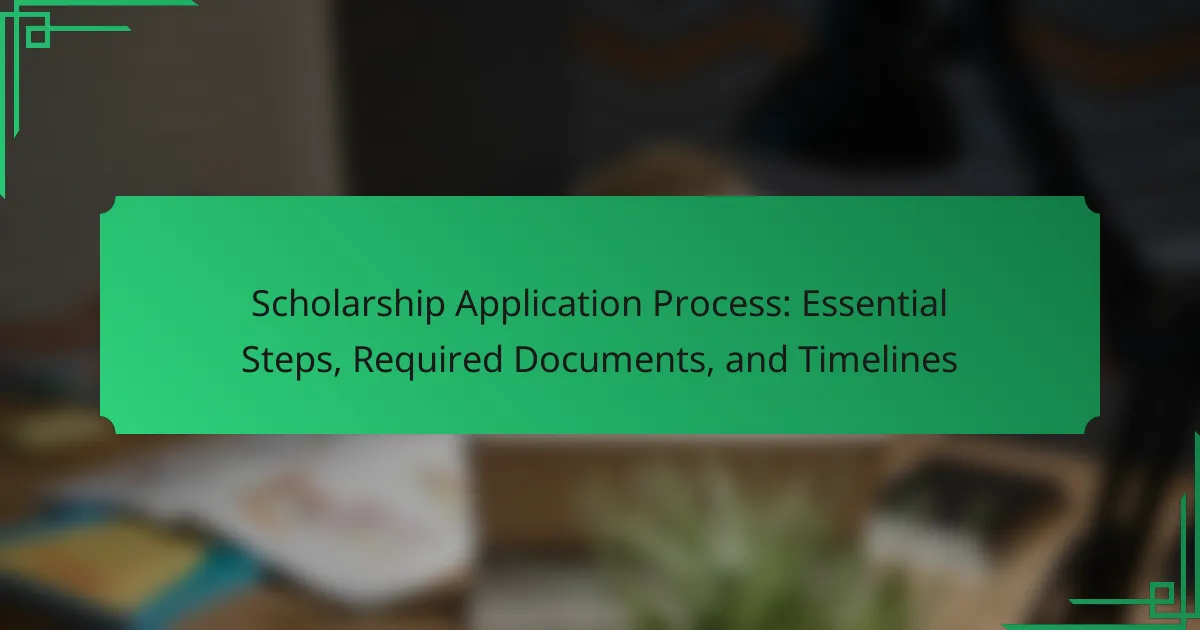
What are Merit-Based Scholarships?
Merit-based scholarships are financial awards given to students based on their academic, artistic, or athletic achievements. These scholarships aim to recognize and reward exceptional performance in specific areas. They do not consider financial need as a criterion for selection. Students may apply for these scholarships through various institutions, including colleges and private organizations. Merit-based scholarships can significantly reduce the cost of education. For example, the National Merit Scholarship Program awards scholarships based on standardized test scores. This program highlights the competitive nature of merit-based scholarships and their role in promoting academic excellence.
How do Merit-Based Scholarships differ from Need-Based Scholarships?
Merit-based scholarships are awarded based on a student’s academic, artistic, or athletic achievements. Need-based scholarships, on the other hand, are granted based on a student’s financial circumstances. Merit-based scholarships typically require a strong GPA or test scores as eligibility criteria. In contrast, need-based scholarships often require financial documentation to assess a student’s economic situation. Merit scholarships aim to reward high achievers, while need-based scholarships focus on assisting those who require financial help. According to the National Scholarship Providers Association, merit scholarships account for a significant portion of available funding, highlighting their importance in higher education financing.
What criteria are used to determine merit in merit-based scholarships?
Merit-based scholarships are determined by several criteria. These criteria typically include academic achievement, such as GPA and standardized test scores. Extracurricular involvement is also considered, highlighting leadership roles and community service. Some scholarships may evaluate special talents, like athletic or artistic abilities. Personal essays and letters of recommendation provide insight into the applicant’s character and motivation. Certain scholarships may prioritize diversity or unique backgrounds as part of their selection process. Each scholarship has specific requirements, so applicants should review them carefully.
Why are merit-based scholarships important for students?
Merit-based scholarships are important for students because they recognize academic excellence and achievements. These scholarships provide financial support that can significantly reduce the burden of tuition costs. According to the National Center for Education Statistics, merit-based scholarships account for a substantial portion of financial aid, helping students afford higher education. They also encourage students to maintain high academic standards, fostering a culture of excellence. Additionally, merit-based scholarships can enhance a student’s resume, making them more competitive in the job market. Research from the College Board indicates that students who receive merit-based scholarships often graduate at higher rates. Overall, these scholarships play a crucial role in enabling students to pursue their educational goals without excessive financial strain.
Who is eligible for Merit-Based Scholarships?
Students who demonstrate exceptional academic achievement are eligible for merit-based scholarships. Eligibility criteria often include maintaining a high GPA, standardized test scores, and involvement in extracurricular activities. Some scholarships may also consider leadership skills and community service. Specific requirements vary by scholarship provider. For example, the National Merit Scholarship Program requires high PSAT scores for consideration. Many institutions also offer merit scholarships based on their own academic standards. Students should review individual scholarship guidelines for detailed eligibility requirements.
What academic achievements are typically required for eligibility?
Merit-based scholarships typically require a minimum GPA of 3.0 on a 4.0 scale. Some scholarships may demand higher GPAs, such as 3.5 or above. Standardized test scores, like the SAT or ACT, are often necessary. Many scholarships specify minimum score thresholds for eligibility. Additionally, academic honors or awards can enhance a candidate’s profile. Leadership roles in academic clubs or organizations may also be considered. Extracurricular activities related to academics can further support eligibility. High school transcripts are usually required to verify academic achievements.
Are there specific extracurricular activities that enhance eligibility?
Yes, specific extracurricular activities can enhance eligibility for merit-based scholarships. Activities such as leadership roles in student government, participation in academic clubs, and community service projects demonstrate commitment and initiative. Sports involvement can also be beneficial, showing teamwork and discipline. Research indicates that scholarship committees often favor applicants with diverse extracurricular engagements. For example, a study by the National Scholarship Providers Association found that 70% of scholarship providers value leadership experience. These activities can set candidates apart in competitive scholarship applications.

What are the Application Forms for Merit-Based Scholarships?
Merit-based scholarships typically require specific application forms. These forms often include a general application form, which collects basic personal information. Applicants may also need to submit essays detailing their achievements and goals. Additionally, some scholarships require letters of recommendation. Transcripts showing academic performance are frequently requested as well. Each scholarship may have unique forms tailored to its criteria. Applicants should check the scholarship provider’s website for specific requirements. Completing all required forms accurately is essential for consideration.
How do I find the right application forms for specific scholarships?
To find the right application forms for specific scholarships, start by visiting the scholarship provider’s official website. Most scholarship organizations provide downloadable application forms directly on their sites. Check the eligibility criteria to ensure you are applying for the correct scholarship. Many educational institutions also list available scholarships and their application forms on their financial aid pages. Additionally, scholarship search engines can help you locate various scholarships and their application requirements. Make sure to read all instructions carefully to complete the application correctly.
What information is commonly required on scholarship application forms?
Scholarship application forms commonly require personal information, academic records, and financial details. Personal information includes the applicant’s name, contact information, and date of birth. Academic records typically consist of transcripts, GPA, and standardized test scores. Financial details may involve income information and family financial status. Some applications also ask for letters of recommendation and personal essays. These components help assess eligibility and suitability for the scholarship.
How can I ensure my application form is completed correctly?
To ensure your application form is completed correctly, follow the provided instructions meticulously. Read the application guidelines thoroughly before starting. Fill in all required fields accurately and double-check for any errors. Use clear and concise language throughout the form. Review your answers for consistency and clarity. If applicable, attach all necessary documents as specified. Seek assistance from a mentor or advisor if you have questions. Finally, submit the application before the deadline to avoid any last-minute issues.
What supporting documents are needed for scholarship applications?
Supporting documents for scholarship applications typically include academic transcripts, letters of recommendation, and a personal statement. Academic transcripts provide proof of the applicant’s educational background and performance. Letters of recommendation are usually written by teachers or mentors who can attest to the applicant’s qualifications. A personal statement allows applicants to express their goals and motivations for seeking the scholarship. Some scholarships may also require financial aid forms or proof of community service. Each scholarship may have specific requirements, so it is essential to review the guidelines for each application carefully.
Why are recommendation letters important in the application process?
Recommendation letters are important in the application process because they provide third-party validation of an applicant’s qualifications. These letters offer insights into an applicant’s character, work ethic, and achievements. They help scholarship committees assess the applicant beyond grades and test scores. A study by the National Association of Colleges and Employers shows that 85% of employers consider recommendation letters when making hiring decisions. This demonstrates their value in evaluating potential candidates. Strong recommendation letters can significantly enhance an applicant’s chances of receiving merit-based scholarships. They can highlight unique attributes that may not be evident in the application.
What role do transcripts play in the application for merit-based scholarships?
Transcripts are critical in the application for merit-based scholarships. They provide a comprehensive record of a student’s academic performance. Scholarship committees use transcripts to evaluate a candidate’s grades and coursework. High academic achievement often correlates with scholarship eligibility. Transcripts can reflect the rigor of a student’s curriculum. Advanced courses and high GPAs enhance the applicant’s profile. Many scholarships require a minimum GPA as part of their criteria. Therefore, transcripts serve as a key component in assessing merit and suitability for funding.

What are the Deadlines for Merit-Based Scholarship Applications?
Merit-based scholarship application deadlines vary by institution and scholarship program. Most colleges set deadlines between November and March for the following academic year. Specific deadlines can be found on the scholarship provider’s website. Some scholarships may have early decision deadlines in the fall. It is crucial for applicants to check each scholarship’s criteria for exact dates. Missing a deadline can result in disqualification from consideration. Always prepare applications well in advance to ensure timely submission.
How can I find out the deadlines for different scholarships?
To find out the deadlines for different scholarships, visit scholarship websites and databases. Many educational institutions maintain dedicated scholarship pages. These pages often list application deadlines and requirements. Additionally, scholarship search engines like Fastweb or Cappex provide comprehensive listings. You can also check with your school’s financial aid office for relevant information. They typically have up-to-date details on available scholarships. Furthermore, subscribing to scholarship newsletters can keep you informed of upcoming deadlines. Regularly reviewing these resources ensures you do not miss important dates.
What are some common timelines for scholarship applications?
Common timelines for scholarship applications typically range from a few months to a year in advance of the academic term. Many scholarships open applications in the fall, around September to November. Deadlines for these scholarships often fall between January and March of the following year. Some scholarships may have rolling admissions, allowing applications to be submitted at any time until funds are exhausted. It’s essential for applicants to check specific scholarship websites for exact dates. For example, the National Merit Scholarship Program has deadlines in early September for the qualifying test. Timely submission is crucial for consideration.
How do I manage multiple scholarship deadlines effectively?
To manage multiple scholarship deadlines effectively, create a detailed calendar. List all scholarship deadlines in one place. Include application requirements and submission methods for each. Prioritize scholarships based on deadlines and eligibility criteria. Allocate specific time blocks for completing each application. Set reminders a week before each deadline. Review all materials for accuracy before submission. Tracking progress ensures timely completion and reduces last-minute stress.
What tips can help improve my scholarship application success?
To improve your scholarship application success, focus on meeting eligibility criteria and crafting a strong personal statement. Understand the specific requirements of each scholarship. Tailor your application to highlight relevant achievements and experiences. Request recommendation letters from credible sources who know your strengths. Proofread your application to eliminate errors and ensure clarity. Submit your application well before the deadline to avoid last-minute issues. Research the scholarship organization to align your values with theirs. According to a study by the National Scholarship Providers Association, complete and error-free applications have a higher success rate.
How can I showcase my achievements effectively in my application?
To showcase your achievements effectively in your application, use clear and concise language. Begin with a summary of your most significant accomplishments. Quantify your achievements with specific numbers or outcomes when possible. Highlight relevant experiences that align with the scholarship’s goals. Use bullet points for clarity and easy readability. Include awards, recognitions, or leadership roles that demonstrate your skills. Tailor your achievements to the specific criteria of the scholarship. This method increases the likelihood of your application standing out among others.
What common mistakes should I avoid when applying for scholarships?
Common mistakes to avoid when applying for scholarships include missing deadlines. Many applicants fail to submit their materials on time. Incomplete applications are another frequent error. Submitting forms without all required documents can disqualify candidates. Failing to follow instructions is also a significant issue. Each scholarship has specific guidelines that must be adhered to. Additionally, overlooking the importance of personal statements can weaken applications. A well-crafted personal statement is crucial for standing out. Lastly, not researching the scholarship can lead to applying for unsuitable opportunities. Understanding the scholarship’s focus and requirements is essential for success.
Merit-based scholarships are financial awards given to students based on their academic, artistic, or athletic achievements, without considering financial need. This article outlines the eligibility criteria for these scholarships, including required academic performance, extracurricular involvement, and supporting documents such as transcripts and recommendation letters. It also details the application process, including necessary forms and common deadlines, while providing tips for improving scholarship application success. Understanding these key aspects can help students effectively navigate the competitive landscape of merit-based scholarships.



